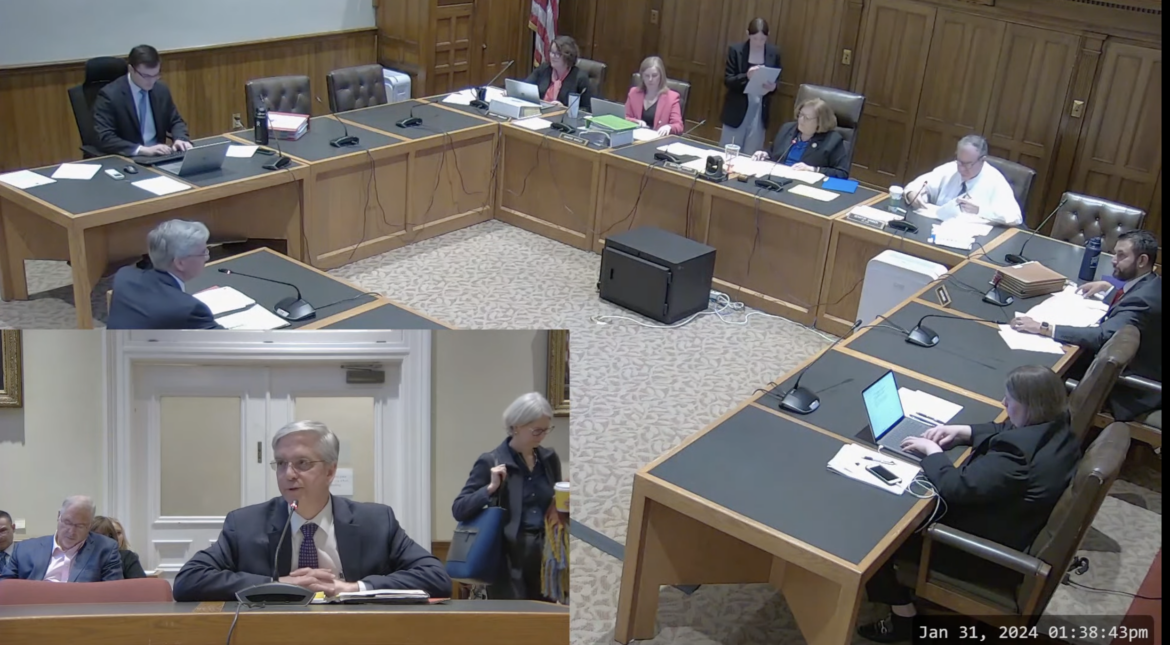CONCORD – State Sen. Denise Ricciardi, R-Bedford, introduced a bill before the Senate Judiciary Committee that would hold liable facilities that used PFAS, or forever chemicals, in manufacturing. The bill, SB 413, would require PFAS facilities to be personally responsible for containment, cleanup, restoration, or other remediation regarding the “release or threatened release of hazardous waste or hazardous material.”
It also authorizes the attorney general to institute civil action to recover costs residents incurred as a result from PFAS pollution caused by a responsible facility.
“We need to be responsible and take care the people and the health of the Granite Staters,” Ricciardi said. “It should not be at the burden of our towns, our municipalities, or the state.”
The bill is another in a chain of legislation that addresses PFAS pollution, accountability, and its impact on human health after several instances of drinking water contamination. Merrimack is one of the most prolific cases of water contamination, home to the soon-to-close company Saint-Gobain which was known to pollute the town’s drinking water with PFAS.
Mike Wimsatt, Director of the Waste Management Division at the Department of Environmental Services, testified in support of the bill. Wimsatt argued that the bill would successfully put responsibility into the hands of the owners and operators of PFAS facilities who have contaminated ground and surface water, forcing them to be liable to provide clean and safe water to those who were impacted.
Sen. Bill Gannon asked Wimsatt if a new property owner takes over a contaminated facility, what their responsibility would be under this bill. While Wimsatt acknowledged that is a complex, situation-dependent legal question, liability should remain with the original owner who caused contamination.
Wimsatt also pointed out that the bill provides a “firmer legal footing” for individuals who wish to bring action against the facilities.
According to the bill, a “PFAS facility” refers to “any site, area, or location where PFAS is or has been used, treated, stored, generated, disposed of, or otherwise come to be located.”
Kirsten Koch, Vice President of Public Policy at the New Hampshire Business and Industry Association, said this definition was “overly broad and sweeping” in her oppositional testimony to the bill.
“We believe it diminishes existing legal standards, propels anti-business ideology, and contains overly broad language that would likely create a wave of unintended consequences that would severely harm the business climate in New Hampshire,” Koch said.
In her initial testimony, Sen. Ricciardi indicated a new amendment had been added to the bill to protect small businesses that would be impacted by the legislation for unknowingly releasing small concentrations of PFAS—what Koch called a “modest improvement.”
Koch said that this bill would lower the burden for the state to prove the case for the benefit of those pursuing action against business related to PFAS pollution, leading to costly litigation for such businesses.
“BIA is aware of no circumstance in which the existing legal process has been insufficient in protecting the environment,” Koch said.
Michael Strand, a resident of Bedford and the citizen representative on the HB 737 PFAS Commission, spoke to the committee from the perspective of the people actively dealing with PFAS contamination in their water and the desire for accountability.
“I never thought I’d be in a situation where I’d have a guy on my basketball team asking me whether I think it’s okay for his pregnant wife to take a shower in his house, because PFAS contamination most severely affects pregnant women,” Strand said.
Strand recounted instances where dozens of Bedford residents told stories of people they knew with cancer, one of the possible outcomes of chronic PFAS exposure. Beyond health impacts, Strand described the burden currently placed on taxpayers who have to pay federal tax on the state rebate program for PFAS water filtration systems.
“We need to put people over money right now,” Strand said. “There’s nothing pro-business about these sort of emissions and contamination in the long term.”
He argued that this bill would lessen the burdens and barriers of the average working-class families in New Hampshire coping with the aftermath of PFAS pollution—something that he urged the legislators to prioritize.
“I want to see you put this bill on the floor so that as legislative leaders and Senators, you know you did the right thing,” Strand said.
“When you go home today you hug your kids, and you can look them in the eyes, and you know that you defended the basic property rights of New Hampshire residents and property owners,” Strand said. “And you know you defended kids’ inalienable right to drink clean water.”






